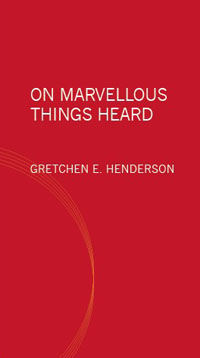 On Marvellous Things Heard
On Marvellous Things Heard
By Gretchen E. Henderson
Green Lantern Press, 2011
91 pages / $12 Buy from Green Lantern
The pupil…having fallen sick, was dumb for ten days; but on the eleventh, having slowly come to her senses after her delirium, she declared that during that time she had lived most agreeably.[1]
Chicago-based Green Lantern is a non-profit press helmed by Caroline Picard and other artists, focused on bridging contemporary experience with historical form. The Press brings forth “emerging and forgotten texts” within a cultural climate where the humanities must often defend themselves. You may recall their notable release of last summer, Erica Adams’ utterly innovative The Mutation of Fortune. Blake Butler wrote in March, 2010: “Green Lantern Press is simply making some of the most beautiful, singular limited run book objects of anybody in the pack. If you haven’t browsed their catalog recently, it’s overflowing: such a wide range of things to dig in, from new translation of Rimbaud, to art space phone books, to indexes and collection, so on.”
Gretchen E. Henderson’s On Marvellous Things Heard is no exception.
Incited by one extant fragment within Aristotle’s paradoxography text, Minor Work, Henderson labels her book an essay: a slim, tidy, hypnotic volume of 178 prose entries grappling with literature’s capability of achieving the realm of music (178 being, fittingly, the number of Aristotle’s identically titled anecdote). Here begins a sumptuous tapestry, invoking sage fragments of Theodor Adorno, Thomas Mann, Anne Carson, Toni Morrison, Bruce Holsinger, James Baldwin, Allen Ginsberg, John Hawkes, W.E.B. DuBois, and James Agee—for a start.
Henderson asks:
Ten entries later:
And yet, On Marvellous Things Heard begins, solely, like this:
In her “Prelude” to the work, Henderson explains: “By trying to inhabit the essay’s interstitial spaces—literal, aural, and otherwise—I follow Umberto Eco’s concept of the ‘open work,’ as well as John Cage’s motivation for musical composition: not self-expression, but self-alteration.”
Such alteration means text as metamorphosis, a quest “moving beyond critical boundaries,” an elusive voice that “becomes permissive behind its theoretical veil, like the shape-shifting boundary between speech and song.” On Marvellous Things Heard steeps and stews in this threshold, this intermediary realm between binaries, this white space:
3. • With regard to poetry, Stéphane Mallarmé addressed white space in his preface to Un coup de dés, saying that verse demands white “as a surrounding silence.”
4. • Epigraphs work similarly with white space.
To the between of sound and silence, black mountains of text amidst bloated white swaths of air, Henderson invites her readers: “to contemplate and respond in whatever form (even in white space: refuting, concurring, doodling, dreaming) about our world’s natures and nuances, volitions and vulnerabilities: its marvels.”
The text quests to metamorphose, conjured in Federico Garcia Lorca’s duende:
The essay is thus supremely aware of its own form—178 prose fragments, white space—assaying the reader with its own awareness of itself, its inevitability:
Joachim Neugroschel said the above; and then, later, Henderson translates this from Christopher Maurer:
The echoes: the call,
the response.
By definition, form is morally blind: its sole drive is to mean something. In its inevitability lies its indifference to assignation of value. Could one, thus, call the text silent?
81. • The spaces between translations and metamorphoses—of sound, of silence—may be more telling than what stories are told. Within these variations:
82. • How can we know the singer from the song?
In fragment 33, Henderson recalls William Butler Yeats: “How can we know the dancer from the dance?”
Henderson, trained as a classical vocalist and historian, engages in her literary works both music and visual arts; her first novel, Galerie de Difformité, structured as an art catalogue, won the 2011 Madeleine P. Plonsker Emerging Writer’s Prize from &NOW Books.
68. • There she is.
114. • But where is she?
In awareness of its form, On Marvellous Things Heard possesses a superabundant consciousness: nearly every fragment includes a footnote, which means experiencing the book sensorially, flipping forth and back, from product to originator, from expression to creator—a song-song, lilting effect akin to melody. Space and non-space, sound and silence. In that interlude of assigning a maker to the quotation is the echo of the self dismantling the self, and progressing through the work.
In this progression, we are consumed with process over product:
and
The experience of On Marvellous Things Heard is to be an interloper between silence, and one type of silence, and our silence, expressed in a form that demands acknowledgment even as it has no choice but to do so; and so creating cohesion within and between the spaces of text and paper, reader and author, listener and hearer, eye and paper, eye and sound of words in one’s head, dancer and dance, creator and created, form and content, even as it dissolves, like Orpheus, finding Eurydice and losing her again, following his inevitable
We are already there.
***
[1] “On Marvellous Things Heard” #178,” The Complete Works of Aristotle: The Revised Oxford Translation, vol. II, ed. Jonathan Barnes, trans. L.D. Lowdall (Princeton: Princeton UP, 1984) 1298.
***
Tags: August Evans, green lantern press, Gretchen E. Henderson, On Marvellous Things Heard

How are there negative comments on here? Does that mean one was deleted? Cool
[…] “Incited by one extant fragment within Aristotle’s paradoxography text, Minor Work, Henderson labels her book an essay: a slim, tidy, hypnotic volume of 178 prose entries grappling with literature’s capability of achieving the realm of music (178 being, fittingly, the number of Aristotle’s identically titled anecdote). Here begins a sumptuous tapestry, invoking sage fragments of Theodor Adorno, Thomas Mann, Anne Carson, Toni Morrison, Bruce Holsinger, James Baldwin, Allen Ginsberg, John Hawkes, W.E.B. DuBois, and James Agee—for a start.” But you can read the whole thing by going here. […]
[…] On Marvelous Things Heard by Gretchen E. Henderson reviewed by HTML Giant […]